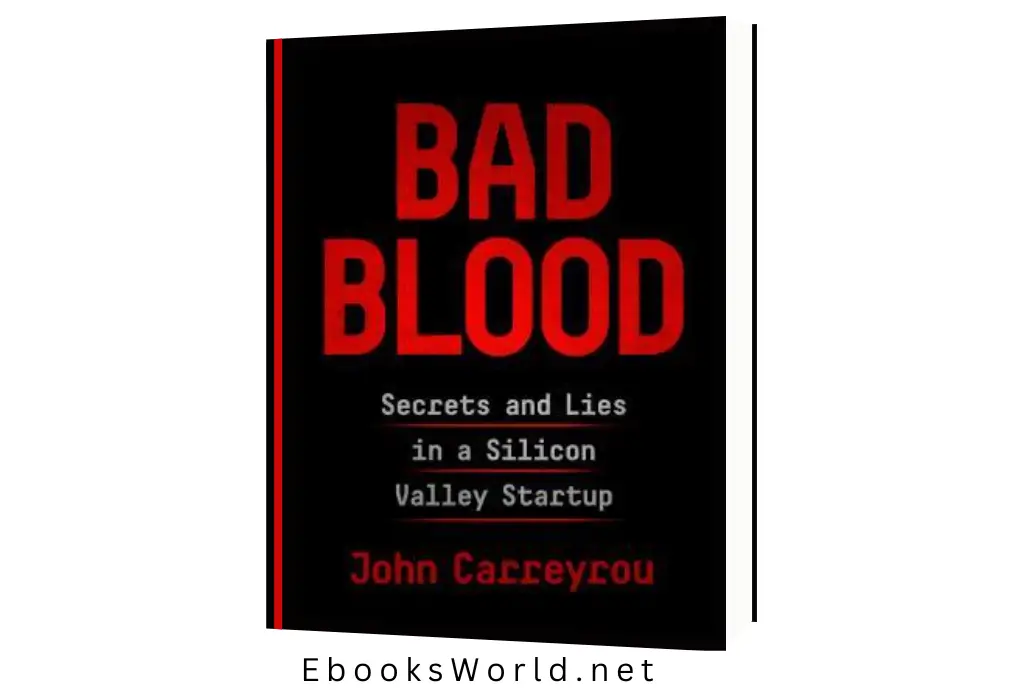Bad Blood: Secrets and Lies in a Silicon Valley Startup
“Bad Blood: Secrets and Lies in a Silicon Valley Startup” is a riveting non-fiction book written by John Carreyrou, a Pulitzer Prize-winning journalist. The book delves into the rise and fall of Theranos, a once-promising biotech company founded by Elizabeth Holmes. Theranos was supposed to revolutionize the healthcare industry by offering a groundbreaking blood-testing technology that could perform a wide range of tests using just a few drops of blood. However, as Carreyrou uncovers, the reality was far from the grand promises.
The Rise of Theranos and Elizabeth Holmes (2003-2013)
The narrative begins with Elizabeth Holmes, a charismatic and ambitious young woman, dropping out of Stanford University to pursue her vision of revolutionizing healthcare. In 2003, she founded Theranos with the promise of making diagnostic testing more accessible, efficient, and affordable. The company quickly gained attention and was hailed as the next big thing in Silicon Valley.
Holmes became a prominent figure, modeled after iconic Silicon Valley entrepreneurs like Steve Jobs. She captivated investors, built influential connections, and amassed a considerable fortune. The company’s valuation soared to billions of dollars, making Holmes the youngest self-made female billionaire.
The Deception Unraveled (2014-2015)
However, cracks in Theranos’s facade began to appear. Carreyrou, investigating for The Wall Street Journal, started receiving tips from whistleblowers within the company who were concerned about the accuracy and reliability of Theranos’s technology. The book chronicles Carreyrou’s investigative journalism efforts and the challenges he faced in uncovering the truth.
As Carreyrou delves deeper, he discovers that the technology touted by Theranos, which claimed to run comprehensive blood tests with just a few drops of blood, was a sham. Former employees revealed the company’s culture of secrecy, fear, and deception. Theranos had misled investors, patients, and the public about the capabilities of its blood-testing technology.
The Downfall of Theranos (2015-2018)
The book details the intense legal and ethical battles that ensued as Theranos attempted to protect its reputation and hide the truth. Holmes, once celebrated as a visionary, faced mounting pressure as her empire crumbled. Regulatory agencies, including the FDA and CMS, became involved, raising serious concerns about the potential harm caused by inaccurate test results.
Holmes’s leadership style, characterized by secrecy and intimidation, contributed to the toxic culture within Theranos. Employees were afraid to speak out, and those who did faced retaliation. The book exposes how the company’s leadership manipulated data, misled investors, and engaged in unethical practices to maintain the illusion of success.
Legal Consequences and Lessons Learned
Theranos eventually faced lawsuits, investigations, and settlements. Holmes and former president Ramesh “Sunny” Balwani were charged with massive fraud by the SEC, leading to a high-profile trial. The legal proceedings unveiled the extent of the deception and the personal responsibility of Holmes and Balwani.
“Bad Blood” highlights the importance of journalistic integrity and the role of investigative reporting in exposing corporate fraud. Carreyrou’s tenacity and commitment to the truth played a crucial role in uncovering the Theranos scandal. The book also raises broader questions about the culture of Silicon Valley, the dangers of unchecked ambition, and the need for ethical business practices in the tech industry.
Conclusion
“Bad Blood” is a compelling and cautionary tale of corporate greed, deception, and the consequences of prioritizing ambition over ethics. Elizabeth Holmes’s rise and fall serve as a stark reminder of the dangers of blind faith in charismatic leaders and the importance of holding individuals and companies accountable for their actions. The book serves as a valuable case study for business students, entrepreneurs, and anyone interested in the intersection of technology, ethics, and accountability in the corporate world.







